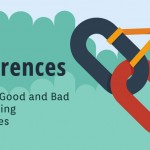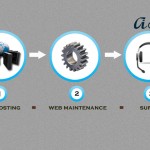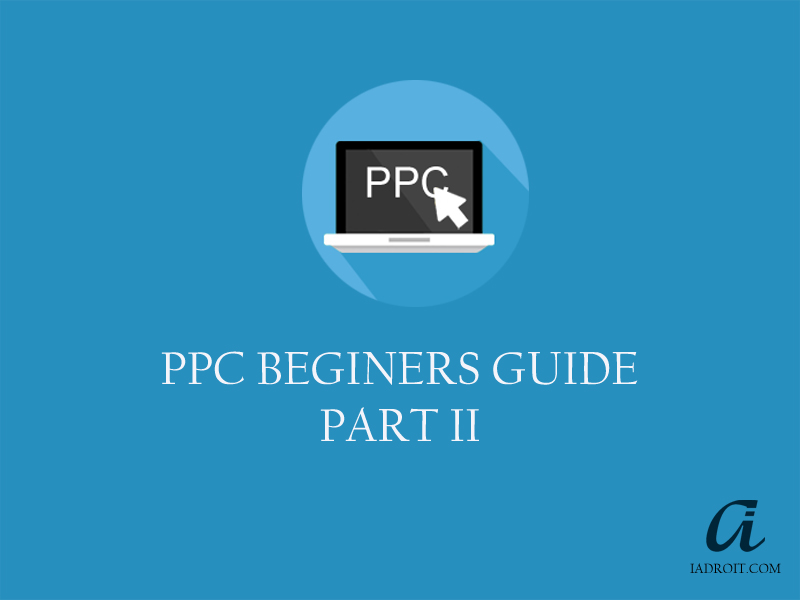
PPC Basics for beginners
We learnt about the Basics of PPC Part I which is written for the benefit of beginners at Google Ads and paid search marketing. This paper is a continuation of what we learnt about Google AdWords and Pay Per Click campaign set up. Today, we will learn about the Google bidding process, how are PPC campaigns set up, and what factors to consider while creating a PPC Ad.
Understanding AdWords Bidding
We have learnt about the basic difference between different kinds of ad options like CPC, CPA, CPV etc. Let us understand the different bidding options to determine when you want to focus on CPC and when on another form of Ad.
CPC is one of the most cost effective and popular forms of Pay PerClick ad recommended for beginners. CPC is chosen when you are mainly focussing on clicks on your ad. There are two ways you may bid on CPC – The Automatic Bidding and the Manual Bidding.
Automatic Bidding is the simplest form where you simply set a daily budget and your ads appear until you have reached the budget limit for the day.
Manual Bidding is for advertisers who want a better control of the various keywords or keyword groups they are advertising on. Look at the example below to understand when you might want to use manual bidding.

Manual bidding requires greater control and understanding of the PPC platform, and you will do better with experience. As a beginner, you might want to depend on the automatic bidding to learn the ropes.
When your marketing goal is Branding, vCPM is a viable option, where you want more visitors to see you, you logo and get to know your brand. You can set budgets at the keyword group level or individual keyword level.
Conversions oriented marketing for businesses should focus on CPA. AdWords will try to place your ads to maximize your successful call-to-action for your specified budget. This form of bidding is recommended for advanced AdWords marketers.
A business might also want to promote video commercials or product demonstrations. For such marketing goals, CPV is recommended. You can set a budget both at the ad group level. Learn more about CPV.
 You might also want to consider what is referred to as AdWords Automated Bidding.
You might also want to consider what is referred to as AdWords Automated Bidding.
How to start advertising on AdWords?
Here are the steps for a beginner to start advertising on PPC. Make sure you follow these points before you actually begin your PPC campaign.
Marketing Goals -> Platform -> Keywords -> Budget -> Ad Copy -> Landing Page -> Track Performance
A PPC Campaign on Google AdWords needs to go through these stages. We will discuss the points singularly in greater detail.
Marketing Goals Your offer or what you want to promote is very important in deciding your course or action. Your marketing goal could be more visits, form submissions or more sign ups. Decide on what you want to achieve from the ad campaign. From choosing the keywords to building you ad copy, it will all depend on what your offer is.
Platform The platform is decided based on the goal. The most highly recommended platform for small business paid marketing is CPC. Let’s talk about CPC in greater detail. We have already discussed the basic difference between the two types of bidding possible for CPC. What should you choose -Manual or Automatic Bidding strategy? Since we are addressing the inexperienced PPC marketers in this guide, my recommendation for all beginners is to go for the automatic bidding of CPC before you start to manually manage your bids. Automatic bidding means you rely on Google to decide your CPC for each keyword. This also eliminates the planning that you otherwise have to do in order to determine how to assign a budget for each keyword group.
Once you spend some time understanding the bidding process, you can then graduate to manual bidding which can be a great way to optimize your PPC budget.
Moving on to the next big question.
Keywords The choice of the right keyword group determines the CTR – besides your budget. Meaning if you choose the right search terms that your target audience are using to look for products or services, you are likely to show up on their search results. (assuming you have a good ad quality). Keywords should also focus on the right user intent – whether searching for information only or with an intent to purchase/sign up etc.
Budget Understanding your goals, your profit margins and your available funds, decide on a monthly ad budget. For beginners, this sounds like a vague advice. For you, anything between $600 to $1000 a month is a good budget. Raise your budget as you grow more comfortable and start getting a grip on things.
I have discussed this in further details below.
Ad Copy Google AdWords allows you to design your Ads with layers of information. Use this space to feed as much relevant information as possible. More information, choices, business details offers a user more credibility about an offer, and more reasons to click on the ad. Add rich snippets, media, and most definitely ensure your Ads are optimized for mobile.
Landing Page If a user clicks through an ad and lands on your landing page, AdWords has successfully brought you a lead. What happens from here is not in the hands of Google anymore – you take charge. A user on landing page needs to be motivated to complete the call-to-action and convert. That needs some work. Remember to
- Relevant to the Ad offer
- Targeted and specifically highlight a certain offer instead of generic service pages or home page.
- Compelling to-the-point content
- Display trust factors like testimonials, ratings, reviews and rewards.
- Effortlessly highlight the call to action button
- Highlight similar other promotional offers right beside in case he is looking for alternatives.
Learn more about effective landing pages in details here.
Tracking The worst you could do to your Pay Per Click campaign is to start a campaign and forget all about it only to check after a month! This will never succeed. Analyse the performance of your PPC campaign on AdWords on a regular basis meaning (every day) to review what is working and what is not. Especially for a beginner in AdWords, there are more than one ad copy you are going to have to try and test with, including several keyword groups before you know which combination is generating a higher CTR. Keep checking you ad quality, and rely on AdWords inputs to make the modifications.
That said, I would like to talk a bit more in detail about budgeting for a PPC campaign.
How to decide on a PPC budget for Beginners?
The above video from Google throws light on how to go ahead and decide on the PPC budget. Determining the Pay per click budget is very important to ensure that you get the maximum ROI on your marketing spends.
To begin the process of determining your Pay Per Click budget, answer these-
- Pocket For a small business with limited marketing funds, take a look at your finances well to see what kind of marketing budget your wallet can afford, before you plan on how to spend it. Allot a monthly marketing budget for paid Google Ads and stick to it.
- Profit What is the average profit you earn from a sale? That should help you with a fair idea of what a click is worth to you? If you track your existing CPA, that should be a referral point too. Once you have a monthly figure in hand, divide it by 30.4 (precisely the number of days in a month) to get the max amount you want to spend each day on PPC.
- Keyword cost When researching your keywords you will get an idea from AdWords what they are worth. Remember to choose keywords well or you may exhaust your budget with unqualified clicks leading to no business. Choose those keyword terms and phrases that show a favourable intent to convert (perhaps terms like buy, buy online, price, or location specific search terms should be included if you are selling a product).
- Dont bid below 1st page average You should know what your keyword is worth and not bid too low. The AdWords Keyword planner is a great tool to start your research. Bidding too low may result in your ads being ‘limited by budget’ and it will prevent your ads from showing up on the first page. Although you won’t be paying unless a click happens, the point is – you do not mind paying, it is more clicks that you actually want. Check keyword rates in the ‘Avg CPC’ tab when you are doing your keyword research on AdWords.
- Bid competitively for your most important keywords Check the quality score to see if your ad copy is strong enough to fetch you clicks. Check the keyword’s avg position to see if you are ranked above 8. Else increase the bids for the keyword, and improve the quality score. How to improve the quality score has been discussed in the first part of this basic guide.
- You want to ensure your ad quality is high. This helps is optimizing (and saving) on your PPC budget. Typically a higher quality ad has a lower actual CPC.
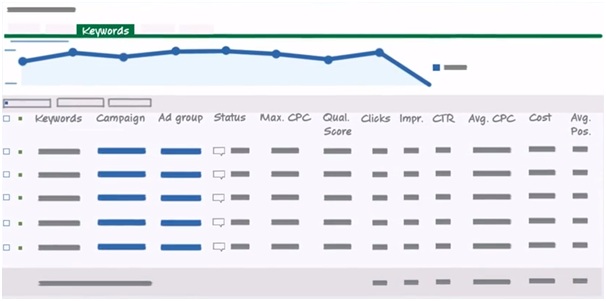 *Source – Google AdWords
*Source – Google AdWords
- Shift your budget as necessary. Keep a track of the performance of your ads and check of alerts like ‘Limited by budget’. Shift your budget if you think one of your ads arent fetching the desired result and invest in a performing ad group.
Once we have a budget, let’s talk precisely about the bidding strategy.
How to determine a Bidding strategy for paid Google Ads?
Lets first focus on your offer to your customer. What are you offering to your customers? Determine when you post an ad, what is it exactly that you are offering, and make groups of each category.
Based on each of these offers, determine the most appropriate keywords. Group your keywords under separate categories based on products/services classification. Each of your Ads should be designed specifically for each keyword group/category to maximize clicks. Refer to the example below for two separate products – red rose bouquets and potted plants.
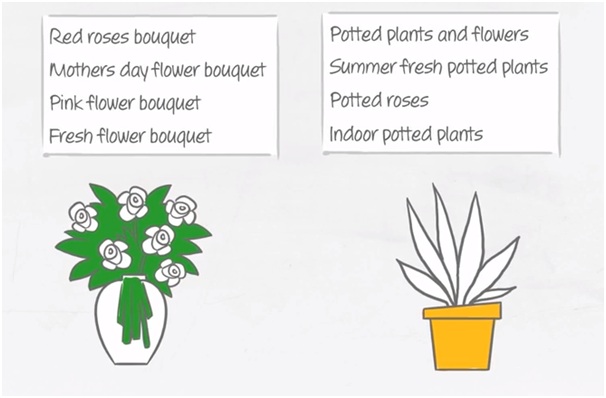 The right keyword length – Two to three words could be a good keyword length to avoid being too general or too specific. Of course this is not an absolute rule; you just have to strike a balance. Like in the example below, you will get a range of keywords, but you have to choose those that are just right for your ‘target audience’ especially for the current offer when you are selling red rose bouquets (and potted plants).
The right keyword length – Two to three words could be a good keyword length to avoid being too general or too specific. Of course this is not an absolute rule; you just have to strike a balance. Like in the example below, you will get a range of keywords, but you have to choose those that are just right for your ‘target audience’ especially for the current offer when you are selling red rose bouquets (and potted plants).
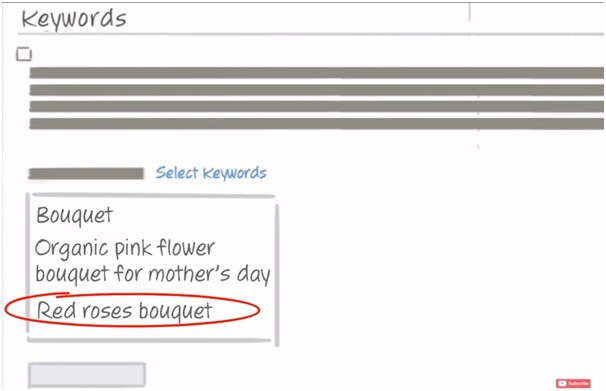 Use the keyword tool in AdWords to get a variety of suggestion of related keywords that may be relevant to your business. You will also get an idea of the competition on each keyword along with the number of people searching with those keywords to come up with your own keyword set.
Use the keyword tool in AdWords to get a variety of suggestion of related keywords that may be relevant to your business. You will also get an idea of the competition on each keyword along with the number of people searching with those keywords to come up with your own keyword set.
Attention grabbing ads. These ads will be targeted to what you are selling, show how they can benefit with a bonus (like a discount or free delivery or vouchers). Additionally feel free to include rich snippets to your ads to make them more informative.
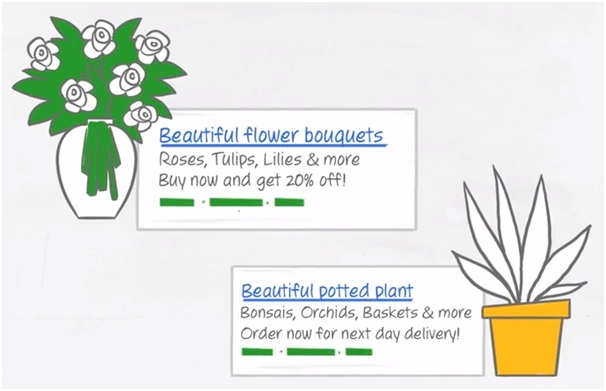 Where does the ad take your visitor? The home page is not the best page to redirect your visitor to when he is coming from an PPC ad. A landing page should be dedicated to the specific product or service your ad talked about, and even more precisely, should display the exact offers you promised in your ad. If this is a promotional offer you do not normally offer regular customers, design a targeted landing page for your PPC campaign for best results.
Where does the ad take your visitor? The home page is not the best page to redirect your visitor to when he is coming from an PPC ad. A landing page should be dedicated to the specific product or service your ad talked about, and even more precisely, should display the exact offers you promised in your ad. If this is a promotional offer you do not normally offer regular customers, design a targeted landing page for your PPC campaign for best results.
- Do not set up a campaign and forget. Once you are up and running, keep a track of how you are performing on AdWords. Check which ad group is performing better, and where you should put your money on. Besides, check the actions or behaviour of the visitors post ad clicks on your Analytics account to see if your landing pages are working and which have higher exits without completing the call to action. Take action accordingly.
Source Google.
We have extensively discussed the points that a beginner in PPC must understand and consider when starting his own AdWords advertising. Next we will be discussing How to Fill up your first AdWords Campaign.
We will soon post back to back tips and more help to manage your PPC campaign for small businesses. Post your feedback below and let us know if you need help in any specific area.


